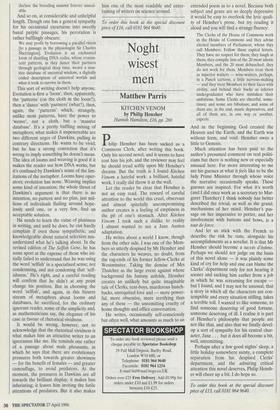Noght wisest men
Matthew Parris
KITCHEN VENOM by Philip Hensher Hamish Hamilton, f16, pp. 260 Philip Hensher has been sacked as a Commons Clerk, after writing this book. Only his second novel, and it seems to have cost him his job, and the reviewer may feel he should tread softly upon Mr Hensher's dreams. But the truth is I found Kitchen Venom a hateful work: a brilliant, hateful work. I really did throw it at the wall.
Let the reader be clear that Hensher is not an easy read. The reward of careful attention to the world this cruel, observant and almost spitefully uncompromising author creates is a feeling of emptiness in the pit of one's stomach. After Kitchen Venom I took such a dislike to reality I almost wanted to see a Jane Austen adaptation.
He writes about a world I know, though from the other side. I was one of the Mem- bers so utterly despised by Mr Hensher and the characters he weaves, no doubt, from the rag-ends of his former fellow-Clerks at Westminster. Taking the demise of Mrs Thatcher as the large event against whose background his fantasy unfolds, Hensher creates an unlikely but quite imaginable tale of Clerks, rent-boys, murderous hunch- backs, unrequited love and — more power- ful, more obsessive, more terrifying than any of these — the unremitting cruelty of home thoughts and office conversation.
He writes, occasionally self-consciously but often well, what amounts as much to an extended poem as to a novel. Because both subject and genre are so deeply depressive it would be easy to overlook the lyric quali- ty of Hensher's prose, but try reading it aloud and you will find a strange fluency: The Clerks of the House of Commons work in the House of Commons and they advise elected members of Parliament, whom they call Members. Follow these capital letters. They have no respect for them; they laugh at them; they compile lists of the 20 most idiotic Members, and the 20 most debauched; they do not work for them. Members treat them as superior waiters — wine-waiters, perhaps, in a Punch cartoon, a little nervous-making — and they treat Members to their faces with civility, and behind their backs as inferior undergraduates who have mistaken their ambitions. Some Clerks are cheerful, some- times; and some are bibulous; and some of them are, in the end, manic depressives, and all of them are, in one way or another, experts.
And in the beginning God created the Heaven and the Earth, and the Earth was without form, and void. Hensher owes a little to Genesis.
Much attention has been paid to the author's presumed comment on real politi- cians but there is nothing new or especially unusual here. Far more interesting to me are his guesses at what it feels like to be the lady Prime Minister through whose voice the narrative occasionally speaks. These guesses are inspired. For what it's worth (and I did once work as a secretary to Mar- garet Thatcher) I think nobody has better described the trivial, as well as the grand, mechanisms of her mind. Hensher's pas- sage on her imperative to potter, and her involvement with buttons and bows, is a tour de force.
And let us stick with the French to describe the risk he runs, alongside his accomplishments as a novelist. It is that Mr Hensher should become a succes d'estime. Perhaps we should not judge on the basis of this novel alone — it was plainly some kind of cry for help and one can blame the Clerks' department only for not hearing it sooner and sacking him earlier from a job in which he was screaming for escape but I found, and I may not be unusual, that a story in which all the characters are con- temptible and every situation stifling, takes a terrible toll. I wanted to like someone, to find someone deserving of good fortune, someone deserving of ill. I realise it is part of Hensher's philosophy that people are not like that, and also that we finally devel- op a sort of sympathy for his central char- acter, Jane . . . but it does all become a bit, well, unremitting.
Perhaps after a few good nights' sleep, a little holiday somewhere sunny, a complete separation from his despised Clerks' department, and the admiring critical attention this novel deserves, Philip Hensh- er will cheer up a bit. I do hope so.
To order this book at the special discount price of f13, call 0181 964 9640.


























































 Previous page
Previous page